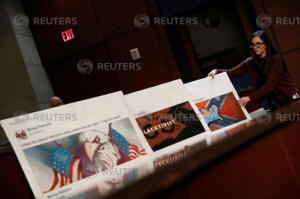|
Russia used social media for widespread
meddling in U.S. politics: reports
 Send a link to a friend
Send a link to a friend
 [December 18, 2018]
By Mark Hosenball [December 18, 2018]
By Mark Hosenball
WASHINGTON (Reuters) - Russian interference
in the 2016 U.S. presidential election on social media was more
widespread than previously thought and included attempts to divide
Americans by race and extreme ideology, said reports by private experts
released on Monday by U.S. senators from both parties.
The Russian government's Internet Research Agency, based in St.
Petersburg, Russia, tried to manipulate U.S. politics, said the reports,
one by social media analysts New Knowledge and the other by an Oxford
University team working with analytical firm Graphika.
The twin reports largely verified earlier findings by U.S. intelligence
agencies, but offered much more detail about Russian activity going back
years that continues even now, said the reports and senior lawmakers.
For instance, one Russian troll farm tried to encourage U.S.
"secessionist movements" in California and Texas, the New Knowledge
report said.

"This newly released data demonstrates how aggressively Russia sought to
divide Americans by race, religion and ideology," said Richard Burr, the
Republican chairman of the U.S. Senate Intelligence Committee, in a
statement.
The Russian agency worked to erode trust in U.S. democratic institutions
and its activities have not stopped, he said. The committee collected
data from social media companies that was used by the private analysts
in their analysis.
Senator Mark Warner, the committee's top Democrat, said, "These reports
demonstrate the extent to which the Russians exploited the fault lines
of our society to divide Americans in an attempt to undermine and
manipulate our democracy.
"These attacks ... were much more comprehensive, calculating and
widespread than previously revealed," he said.
Oxford/Graphika said the Russians spread "sensationalist,
conspiratorialist, and other forms of junk political news and
misinformation to voters across the political spectrum."
[to top of second column]
|

An aide puts out examples of Facebook pages, as executives appear
before the House Intelligence Committee to answer questions related
to Russian use of social media to influence U.S. elections, on
Capitol Hill in Washington, U.S., November 1, 2017. REUTERS/Aaron P.
Bernstein

The group said Russian trolls urged African-Americans to boycott the
election or to follow wrong voting procedures, while also
encouraging right-wing voters to be more confrontational.
Since Donald Trump was elected president in 2016, it said, Russian
trolls have put out messages urging Mexican-American and other
Hispanic voters to mistrust U.S. institutions.
The report from New Knowledge said the Russians ran "comprehensive
Anti-Hillary Clinton operations," such as efforts to organize
Muslims to stage a pro-Clinton demonstration.
The report said Russian hackers also targeted Republican senators
Ted Cruz, Marco Rubio, Lindsey Graham and the late John McCain, as
well as former FBI chief James Comey, special prosecutor Robert
Mueller, and WikiLeaks founder Julian Assange.
A U.S. intelligence report in January 2017 said Russian President
Vladimir Putin directed a sophisticated influence campaign including
cyber attacks to denigrate Democratic presidential candidate Hillary
Clinton and support Trump.
The Kremlin has denied the allegations of meddling. Trump has denied
any collusion between Russia and his campaign.
The matter is being investigated by Special Counsel Robert Mueller,
whose long-running inquiry has clouded the Trump presidency and
netted guilty pleas and indictments against former close Trump
associates.
(Editing by Kevin Drawbaugh and Alistair Bell)
[© 2018 Thomson Reuters. All rights
reserved.]
Copyright 2018 Reuters. All rights reserved. This material may not be published,
broadcast, rewritten or redistributed.
Thompson Reuters is solely responsible for this content.
 |